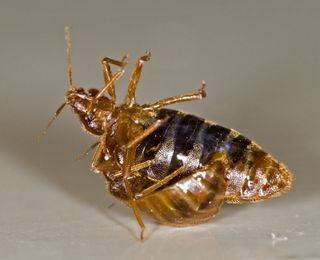Spines and Genital Warfare: How Neil deGrasse Tyson Got Sex Wrong

On March 11, astrophysicist and "Cosmos" host Neil deGrasse Tyson tweeted what was perhaps meant as an amusing quip, but instead served up a dismaying animal biology fail.
"If there were ever a species for whom sex hurt, it surely went extinct long ago," Tyson tweeted.
The idea that sex must be pleasurable in order for a species to be successful is, quite simply, not how evolution works, as a number of science writers and biologists on Twitter were quick to point out. [The Weirdest Animal Penises]
"Humans are sometimes under the misguided assumption that because we enjoy sex, all other animals should — and do," said Carin Bondar, a biologist and author of the book "Wild Sex: The Science Behind Mating in the Animal Kingdom" (Penguin Books, August 2016).
"This couldn't be further from the truth for 99 percent of the animal kingdom," Bondar told Live Science
There are different reproductive strategies for males and females; since egg production is more costly than sperm production, the female must be more selective in her sexual partners. This makes the entire process fraught with conflict and struggle, Bondar said.
Take ducks, which have corkscrew penises that evolved alongside a highly complex vagina with a labyrinthine network of twists, turns and even dead ends, shaped to foil all but the most dedicated phallus. This strategy likely emerged as a way for females to retain some anatomical control over who fathers their offspring, even when they're forced to copulate with multiple partners against their will.
Sign up for the Live Science daily newsletter now
Get the world’s most fascinating discoveries delivered straight to your inbox.
As to whether sex needs to be pleasurable in order to achieve its chief biological goal — reproduction and continuation of the species — Bondar answered with an emphatic "Absolutely not. How it feels has nothing to do with it," she said.
Even for people, sex can be excruciatingly painful. Approximately 176 million women around the world suffer from a frequently undiagnosed condition called endometriosis, which affects the uterus's lining and can cause intense pain during or after intercourse.
Love hurts, love scars
Though some might speculate that unpleasant sex within a species would lead to sex avoidance and eventually result in extinction, there are plenty of examples of animals alive today sporting sexual appendages or engaging in sexual behaviors that cause harm or can in some cases be fatal — and when the reproductive drive kicks into gear, abstinence isn't an option.
In one extreme example, males of the Australian marsupial Antechinus copulate until they drop dead, ambushing females and engaging in two-week-long marathon mating sessions, sometimes mating with one partner for 14 hours at a stretch. The animals keep going until they go blind, lose their fur, develop open sores and succumb to exhaustion.
And in some spider species, the male's penis breaks off completely during sex. Believe it or not, though, they're the lucky ones, compared with the male spiders (and some male insects, like in the mantid family) that serve as a post-coital snack for their hungry female partners.
Spines, darts and genital warfare
Sometimes penises are used as body-piercing lances, in a practice known as traumatic insemination. Land snails shoot each other with love darts, which help the males' sperm survive longer in its partner's body. Male bedbugs puncture the females wherever they can, depositing their sperm in the wound, from where it travels to the ovaries. And hermaphroditic flatworms stage epic penis battles, using their dueling members to outmaneuver each other and impregnate their rivals. These skirmishes leave the loser with gaping wounds in addition to an infusion of worm sperm.
While this sounds unpleasant, does traumatic insemination "hurt?" When bedbugs impale their mates, it certainly appears harmful, but whether there's pain involved — as humans understand it — is another story, said Robert Wiedenmann, head of the entomology department at the University of Arkansas, suggesting that insects' bodies lack the pain receptors that would enable them to experience pain as we do.
"I don't think it would fit a definition of pain. In the absence of pain receptors, there's nothing that signals to the insect that it's being harmed," Wiedenmann told Live Science.
And as with any evolutionary adaptation, if the method gets the job done, then it's considered a reproductive success story — no matter how uncomfortable, painful or deadly it might be.
"It's only going to be sustained if it is more successful than some other route," Wiedenmann said. Ultimately, as far as the survival of a species is concerned, it doesn't really matter whether anyone's having a good time.
Follow Mindy Weisberger on Twitter and Google+. Follow us @livescience, Facebook & Google+. Original article on Live Science.

Mindy Weisberger is an editor at Scholastic and a former Live Science channel editor and senior writer. She has reported on general science, covering climate change, paleontology, biology and space. Mindy studied film at Columbia University; prior to Live Science she produced, wrote and directed media for the American Museum of Natural History in New York City. Her videos about dinosaurs, astrophysics, biodiversity and evolution appear in museums and science centers worldwide, earning awards such as the CINE Golden Eagle and the Communicator Award of Excellence. Her writing has also appeared in Scientific American, The Washington Post and How It Works Magazine. Her book "Rise of the Zombie Bugs: The Surprising Science of Parasitic Mind Control" will be published in spring 2025 by Johns Hopkins University Press.